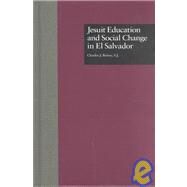Jesuit Education and Social Change in El Salvador
, by Beirne, S.J.,Charles J.- ISBN: 9780815321217 | 081532121X
- Cover: Hardcover
- Copyright: 3/1/1996
This book examines a unique university model for social change-the University of Central America Jos Sime-n Ca-as (UCA) in El Salvador, where the military murdered six Jesuit priests and two women on November 16, 1989. The book addresses such important questions as: Is the role of a university to train managers for maintaining the status quo, or to prepare graduates who will help create a new society? Is the university an ivory tower, or a center for research on social problems? Beginning with the historical, social, economic, and political context of El Salvador, this book examines the university and the factors that contributed to its changed focus, such as liberation theology. The bishops of El Salvador wanted a traditional Catholic university, but the Jesuits and their lay colleagues established an institution of Christian inspiration, free from ecclesiastical entanglements. The rectorate of Luis Achaerandio, S.J. (1969-75) saw new academic programs, research, and social outreach. The UCAtook over the journalEstudios Centroamericanos,which undertook the analysis of such social issues as the 1969 war with Honduras, agrarian reform, and the fraudulent elections of 1972. Rom n Mayorga's term of office included intensified academic and financial planning, and a sharper focus on crucial national issues, with the result that rightist bombs began to explode on the campus and employees were threatened. In 1977, death squads gave the Jesuits a month to leave the country, or be killed, but the Jesuits refused to go. The final chapters cover the Ellacur'a decade: 1979-89. Despite continued bombings and attacks in the press, the UCA expanded academic programs, centers for social outreach, and publications, and played a major role in calling for negotiations to end the civil war which had erupted in the early 1980s.







